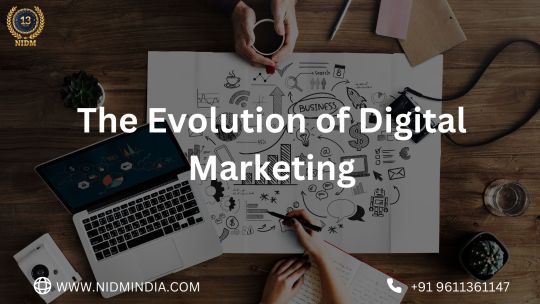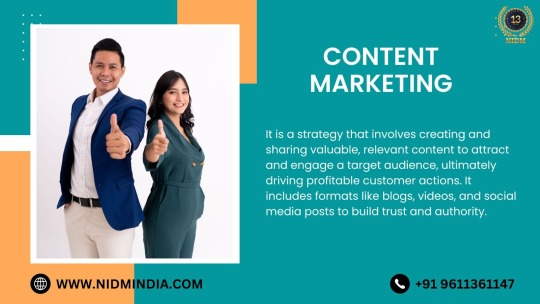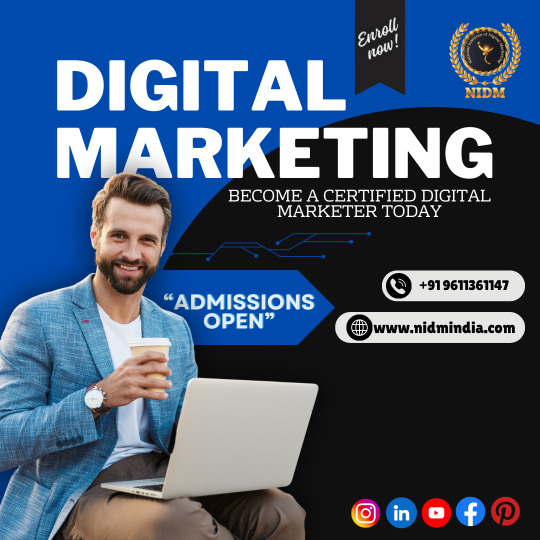#Digital Marketing Institutes in Bangalore
Text
Digital Marketing: Opportunities and Roles in Bangalore

Ever wondered what digital marketing is all about? It's basically promoting things online, like on social media and websites. And guess what? Bangalore's the place to be for it!
Bangalore's packed with digital marketing opportunities. Big companies and startups here are always on the lookout for digital experts like you.
In digital marketing, you can choose what you enjoy doing. Want to be a social media star? You could manage brands' social media accounts. Love making websites pop up first on Google? That's SEO for you!
Bangalore keeps you in the loop on all the latest digital trends. Take courses here to learn the newest tricks and tips.
Digital marketing roles come with good pay. Yup, you read that right! So, not only is it fun, but it can also be rewarding financially.
The digital world is vast, and so are the opportunities in Bangalore. Whether you're into writing, designing, analyzing data, or something else entirely, there's a place for you in digital marketing.
Ready to dive in? Check out Digital Marketing Institutes in Bangalore. We help you learn the ropes and start your journey to success in the world of digital marketing.
0 notes
Text
Hello my friend this is my first post.. if you see it just make like and browsing the link ❤






#fashion#outfit#tshirt#out of shirt#outfit ideas#t shitrt#tshirtlovers#google trends#trendig#trendz#trendyshirt#tshirtideas#cool t shirts#cool hoodies#best mommy#best digital marketing training institute in bangalore#best design#model#woman
3 notes
·
View notes
Text

Looking for a breakthrough in digital marketing? Learn the basics and get your "A" game on! Online or offline, we got everything covered. Hurry up, register now! Visit us at nidmindia.com
#Digital Marketing Institute in India#Digital Marketing Training Institute in Bangalore#Digital marketing institute in BTM layout#Best Digital Marketing Training Institute#Online Digital Marketing Training Institute
1 note
·
View note
Text
Data Privacy and Digital Marketing
Data Privacy and Digital Marketing: Navigating the New Landscape
The digital age has ushered in a wealth of opportunities for marketers, enabling unprecedented access to consumer data and sophisticated tools to analyze it. However, with great power comes great responsibility, and the digital marketing realm is now grappling with the complexities of data privacy. This article explores the key aspects of data privacy in digital marketing, the challenges marketers face, and the strategies they can adopt to navigate this evolving landscape.

Introduction to Data Privacy in Digital Marketing
The Importance of Data Privacy
Data privacy refers to the protection of personal information collected by companies from being misused or exploited without the consent of the individual. In digital marketing, data privacy is crucial for maintaining consumer trust and adhering to legal standards.
The Rise of Data Privacy Concerns
In recent years, data breaches and misuse of personal data have raised consumer awareness and concern about data privacy. High-profile cases and scandals have led to a demand for greater transparency and control over personal data.
Key Regulations Impacting Digital Marketing
General Data Protection Regulation (GDPR)
Scope: Applies to all companies that process personal data of EU citizens, regardless of where the company is based.
Key Requirements:
Obtaining explicit consent from users before collecting or processing their data.
Providing users with the right to access, correct, and delete their personal data.
Implementing data protection by design and by default.
California Consumer Privacy Act (CCPA)
Scope: Applies to businesses that collect personal data from California residents.
Key Requirements:
Providing consumers with the right to know what personal data is being collected and how it is used.
Allowing consumers to opt out of the sale of their personal data.
Ensuring consumers have the right to delete their personal data upon request.
Other Notable Regulations
Personal Data Protection Bill in India: Aims to establish a comprehensive data protection framework.
Brazil’s General Data Protection Law (LGPD): Similar to GDPR, it regulates the processing of personal data in Brazil.
Challenges in Implementing Data Privacy
Balancing Personalization and Privacy
Personalization: Marketers use data to tailor content, offers, and experiences to individual users, enhancing engagement and conversion rates.
Privacy Concerns: Excessive data collection or lack of transparency can lead to privacy concerns and regulatory scrutiny.
Data Management and Security
Data Breaches: Marketers must ensure robust data security measures to prevent unauthorized access and data breaches.
Data Minimization: Collecting only the necessary data and storing it for the shortest time possible to minimize risk.
Compliance with Multiple Regulations
Global Compliance: Companies operating in multiple jurisdictions face the challenge of complying with various data privacy regulations.
Constant Updates: Data privacy laws are continually evolving, requiring marketers to stay informed and adapt their practices.
Strategies for Navigating Data Privacy in Digital Marketing
Building Consumer Trust
Transparency: Clearly communicate data collection and usage policies to consumers.
Consent Management: Implement user-friendly consent mechanisms and respect user preferences.
Data Protection Measures: Invest in robust data security technologies and practices.
Leveraging Privacy-Enhancing Technologies
Anonymization and Pseudonymization: Techniques to protect individual identities while using data for analysis and insights.
Privacy by Design: Integrating privacy considerations into the development of new products and services from the outset.
Educating and Empowering Consumers
Data Literacy: Educate consumers about their data rights and how they can exercise them.
Empowerment: Provide tools and resources for consumers to manage their data preferences easily.
Conclusion
Data privacy in digital marketing is a complex and evolving issue that requires a proactive approach from marketers. By understanding the regulatory landscape, addressing the challenges, and implementing effective strategies, marketers can navigate the digital world responsibly and ethically. Building consumer trust through transparency and robust data protection measures is not only a legal obligation but also a strategic advantage in today’s competitive market. As data privacy continues to shape the digital marketing landscape, staying informed and adaptable will be key to success.4o
0 notes
Text
Best Digital Marketing Training Institute
#best institute in bangalore#best digital marketing academy in bangalore#100% placement#search engine optimization#Social media marketing#Search engine marketing#google ads#Digital marketing#Facebook ads#instagram ads
1 note
·
View note
Text
Best Digital Marketing Institute In Bangalore
When it comes to top-rated digital marketing courses in Bangalore, VK Academy stands out as a highly recommended choice. Here’s why:
Comprehensive Curriculum: VK Academy offers a comprehensive range of digital marketing courses covering SEO, PPC advertising, social media marketing, content marketing, and more. Their courses are designed to equip students with practical skills and industry knowledge.
Expert-Led Instruction: Courses at VK Academy are led by experienced professionals who bring real-world insights into the classroom. Students benefit from expert guidance, personalized mentorship, and hands-on learning experiences.
Practical Learning Approach: VK Academy emphasizes practical learning through projects, case studies, and simulations. This approach allows students to apply theoretical knowledge to real-world scenarios, preparing them effectively for the digital marketing field.
Internship Opportunities: VK Academy provides internship programs that allow students to gain valuable hands-on experience in digital marketing. These internships are a great way to apply classroom learning, build a professional network, and enhance career prospects.
Flexible Learning Options: VK Academy offers flexible learning options with both online and offline courses, accommodating different schedules and learning preferences.
Positive Student Feedback: Many students have praised VK Academy for its quality education, supportive environment, and career-oriented approach.

In conclusion, if you're looking to pursue digital marketing courses in Bangalore that combine comprehensive learning with practical experience and internship opportunities, VK Academy is definitely worth considering.
0 notes
Text
Best Digital Marketing Training Institute in Bangalore
0 notes
Text
What is the scope of digital marketing Courses in Bangalore?

Considering a digital marketing course in Bangalore? Here's why it's a good idea:
Lots of Jobs: Bangalore has many digital marketing jobs because it's a big tech city.
Different Jobs: Digital marketing has many types of jobs, like social media or SEO.
Learn New Things: In Bangalore, you can learn the latest digital marketing stuff.
Good Money: Digital marketing jobs pay well, so you can earn a good salary.
Work Anywhere: You can work from anywhere in the world with digital marketing skills.
Meet New People: In Bangalore, you can meet others who do digital marketing and learn from them.
Always Needed: Every business needs digital marketing, so your skills will always be useful.
Want to learn more? Look into Digital Marketing Institutes in Bangalore. They make learning digital marketing easy, so you can start your new career!
0 notes
Text
Digital marketing institute in Bangalore
#digital marketing course#digital marketing#nidm (national institute of digital marketing) bangalore is one of the leading digital marketing institute in bangalore#nidmindia
0 notes
Text
The Power of Community Building
The Power of Community Building
Introduction
In today's hyper-connected world, brands are no longer just competing for attention, they're vying for a place in our lives. Consumers crave authenticity, connection, and a sense of belonging. This is where the power of community building comes into play. It's not just a marketing tactic; it's a strategic approach that fosters a loyal following, amplifies your brand message, and fuels long-term growth.
Imagine a vibrant space where your customers aren't just passive observers, but active participants. They share experiences, offer support, and celebrate each other's successes. This isn't a pipe dream; it's the essence of a thriving online community. By fostering this sense of connection, you're not just building a customer base, you're building a community of brand advocates.
Community building isn't just about reaping the rewards; it's about fostering a sense of shared purpose. When individuals connect over a shared interest or passion, a powerful synergy emerges. Innovation flourishes as ideas are exchanged, and collaborative problem-solving leads to breakthroughs. This collective intelligence can propel your brand forward in unexpected ways.
However, building a thriving community requires more than just creating a Facebook group. It's about nurturing a safe and inclusive space where people feel valued and heard. Open communication, regular engagement, and addressing concerns promptly are all crucial elements. By becoming an active participant in the conversation, you build trust and demonstrate a genuine commitment to your community's well-being.
The power of community building is undeniable. It fosters loyalty, fuels innovation, and provides a direct line to your target audience. As you delve deeper into this powerful strategy, you'll unlock a world of possibilities, transforming your brand from a faceless entity into a beloved part of your customers' lives.
Matter
In a world increasingly dominated by digital interactions, the human desire for connection remains stronger than ever. This is where community building steps in, offering a potent force for brands, individuals, and causes alike. By fostering a sense of belonging and shared purpose, community building unlocks a multitude of benefits, driving growth, fostering innovation, and creating lasting impact.
The Human Need for Belonging
Humans are social creatures, wired for connection and a sense of belonging. Communities provide this on multiple levels. They offer a space to share interests, experiences, and challenges. They give us a platform to learn from and support each other, fostering a sense of camaraderie and shared identity. This sense of belonging translates to loyalty, trust, and a willingness to engage, all essential ingredients for success in today's digital landscape.
The Benefits of Building a Community
The power of community building extends far beyond simple social interaction. Here are some key benefits:
Brand Advocacy: A strong community fosters brand loyalty and creates a network of passionate advocates who organically promote your brand through word-of-mouth and user-generated content.
Enhanced Customer Insights: Communities provide valuable feedback loops. By listening to your community's needs and challenges, you gain a deeper understanding of your audience, enabling you to tailor your products, services, and marketing strategies for better customer satisfaction.
Innovation and Problem-Solving: Communities are powerful idea generators. By fostering collaboration and knowledge sharing, you tap into the collective intelligence of your community, accelerating innovation and problem-solving.
Improved Brand Reputation: A thriving community reflects positively on your brand. Engaged members create positive online buzz, fostering trust and credibility.
Increased Sales and Growth: Strong communities lead to higher customer lifetime value, repeat business, and increased sales potential.
Building a Thriving Community
Creating a successful community takes more than just throwing people together online. Here's what you need to consider:
Define your purpose: What are you hoping to achieve by building this community? A clear purpose will guide your community development and attract the right members.
Identify your target audience: Who do you want in your community? Understanding their needs, interests, and preferred communication channels is crucial.
Choose the right platform: There's a plethora of online platforms suitable for building communities. Consider forums, social media groups, or dedicated community platforms depending on your audience and goals.
Foster open communication: Encourage active participation through discussions, polls, and Q&A sessions. Respond promptly and address concerns to keep your community engaged. Recognize and reward engagement: Showcase valuable contributions, celebrate milestones, and offer incentives to keep members motivated.
Empower your community leaders: Identify passionate members and give them ownership by allowing them to moderate discussions, create content, and help welcome newcomers. Examples of Powerful Community Building
Here are some inspiring examples of successful community building:
Reddit: This online forum thrives on diverse communities with niche interests, fostering a sense of belonging for millions of users.
Duolingo: The language learning app boasts a vibrant community where users support and motivate each other in their language learning journeys.
SoulCycle: This fitness brand cultivates a strong local community through events, challenges, and a shared passion for health and wellness.
The Future of Community Building
As technology evolves, so too will the way we build communities. Here are some emerging trends:
The rise of virtual communities: Online platforms like the Metaverse will create new opportunities for immersive and interactive community experiences.
The power of micro-communities: Smaller, niche communities focused on specific interests or goals may offer a deeper sense of connection for members.
Hyper-personalization: Leveraging data and AI to personalize the community experience for each member, catering to their unique needs and interests.
To learn moreThe Power of Community Building
JOIN- Digital Marketing Institute in India
#nidmindia#nidm (national institute of digital marketing) bangalore is one of the leading digital marketing institute in bangalore#Digital marketing
0 notes
Text
Digital Marketing Through Social Platforms .

INTRODUCTION:
Social media marketing has emerged as a pivotal strategy in the digital age, leveraging the power of social platforms to connect businesses with their target audiences. This form of marketing involves creating and sharing content on social media networks to achieve marketing and branding goals. The primary activities include posting text and image updates, videos, and other content that drives audience engagement, as well as paid social media advertising.
One of the key advantages of social media marketing is its ability to provide direct communication between brands and consumers. This two-way interaction fosters stronger customer relationships, builds brand loyalty, and provides valuable feedback that can guide product development and customer service improvements. Platforms like Facebook, Instagram, Twitter, LinkedIn, and TikTok offer unique environments and tools for marketers to reach diverse demographic groups with tailored messages.
Content is at the heart of social media marketing. High-quality, relevant, and engaging content can captivate audiences, encouraging them to like, share, and comment, which amplifies the content's reach organically. Visual content, particularly videos, has proven to be exceptionally effective in capturing attention and driving engagement. Furthermore, storytelling through social media posts can humanize a brand, making it more relatable and trustworthy.
Analytics play a crucial role in social media marketing. Platforms provide robust analytics tools that help marketers track performance, measure engagement, and understand audience behavior. These insights are invaluable for refining strategies, optimizing content, and achieving better results. Metrics such as reach, impressions, likes, shares, comments, and click-through rates are commonly analyzed to gauge the effectiveness of social media campaigns.
In addition to organic efforts, paid advertising on social media is an integral component of the strategy. Social media ads can be highly targeted based on user demographics, interests, and behaviors, ensuring that marketing messages reach the most relevant audiences. This targeted approach enhances the return on investment (ROI) for social media campaigns.
Overall, social media marketing is a dynamic and essential aspect of modern marketing strategies. It allows businesses to engage with their audience in real-time, build brand awareness, drive website traffic, and ultimately achieve their marketing objectives. As social media continues to evolve, so too will the strategies and tools available to marketers, making it an exciting and continually developing field.
Matter:
Social media marketing is an integral part of modern business strategy, focusing on leveraging social media platforms to connect with audiences, promote products or services, and achieve various marketing goals. This approach involves creating and sharing content tailored to each platform's unique audience to enhance brand awareness, drive engagement, and ultimately, boost sales.
The essence of social media marketing lies in its ability to facilitate direct and interactive communication between businesses and consumers. Unlike traditional marketing channels, social media allows for real-time feedback and engagement, which helps in building stronger relationships and trust. Businesses can respond to comments, address customer concerns, and participate in discussions, creating a sense of community and brand loyalty. This interaction is invaluable for gaining insights into customer preferences and behavior, which can inform product development and customer service strategies.
Creating compelling content is at the heart of social media marketing. Effective content must be engaging, visually appealing, and relevant to the target audience. This includes a mix of text, images, videos, and infographics designed to capture attention and encourage sharing. Storytelling through social media posts helps humanize brands, making them more relatable and memorable to the audience. Regularly posting high-quality content keeps the audience engaged and interested, fostering a deeper connection with the brand.
Analytics and data play a critical role in the success of social media marketing. Platforms provide comprehensive analytics tools that allow marketers to track and measure performance, understand audience demographics, and monitor engagement metrics such as likes, shares, comments, and click-through rates. These insights enable businesses to refine their strategies, optimize content, and improve their overall marketing effectiveness.
Paid advertising is also a significant component of social media marketing. Social media ads can be precisely targeted based on various criteria, including demographics, interests, and user behavior. This targeted approach ensures that marketing messages reach the most relevant audiences, enhancing the return on investment (ROI) by increasing the likelihood of conversions and sales.
In conclusion, social media marketing is a dynamic and essential aspect of contemporary marketing strategies. It provides businesses with the tools to engage with their audiences, build brand awareness, drive traffic, and achieve their marketing goals in a cost-effective and measurable manner. As social media continues to evolve, so too will the strategies and tools available, ensuring that social media marketing remains an exciting and continually developing field.
Benefits of Social Media Marketing
Increased Brand Awareness:
Social media platforms have vast user bases, providing an excellent opportunity for brands to increase visibility and reach a larger audience.
Cost-Effective:
Compared to traditional marketing methods, SMM is relatively low-cost. Many activities, such as organic posts and engagement, are free, while paid advertising is often more affordable than other forms of advertising.
Enhanced Customer Insights:
Social media analytics provide valuable data on customer preferences and behaviors, helping businesses tailor their strategies and offerings accordingly.
Improved Customer Loyalty:
Direct interaction with customers fosters a sense of community and loyalty. Engaging content and prompt responses to customer inquiries and issues can significantly enhance customer satisfaction.
Real-Time Feedback:
Social media enables real-time communication, allowing businesses to receive immediate feedback on products, services, and campaigns. This quick feedback loop helps in making swift adjustments and improvements.
Implementation
Setting Goals:
Define clear, measurable objectives like increasing followers, driving website traffic, or boosting sales.
Identifying the Target Audience:
Research and understand the demographics, interests, and behaviors of the audience you aim to reach.
Platform Selection:
Choose platforms that align with your business goals and where your target audience is most active.
Content Planning:
Develop a content calendar to maintain consistency and relevance in your posts.
Monitoring and Analysis:
Use analytics tools to track performance, measure success, and refine strategies based on data insights.
Conclusion
Social media marketing is indispensable for businesses looking to enhance their digital presence, engage with customers, and drive growth. By leveraging the unique features of various social media platforms, creating compelling content, and maintaining active engagement, businesses can achieve significant success in today's competitive online environment.
0 notes
Text
The Evolution of Digital Marketing: Past, Present, and Future

Digital marketing has undergone a remarkable transformation since its inception, evolving in tandem with technological advancements and changing consumer behaviors. This evolution from the early days of the internet to today's sophisticated strategies and tools highlights the dynamic nature of digital marketing. Understanding this journey is essential for businesses aiming to thrive in the digital age.
The Past: The Beginnings of Digital Marketing
The 1990s: Early Internet and Email Marketing
The roots of digital marketing trace back to the 1990s with the widespread adoption of the internet. Email marketing emerged as the first recognizable form of digital marketing. Businesses started using email to communicate with customers, though early efforts were often seen as spam.
The advent of search engines, beginning with Archie and later Yahoo and Google, revolutionized information retrieval and laid the foundation for search engine optimization (SEO). The first clickable banner ad appeared in 1994, marking the birth of online advertising. These ads, while basic, opened new avenues for businesses to reach potential customers.
Dot-Com Boom and Social Media’s Genesis
The late 1990s saw the dot-com boom, characterized by significant investments in online businesses. This period saw the rise of e-commerce giants like Amazon and eBay. However, the subsequent dot-com bust in the early 2000s led to a more cautious approach to digital investments.
The mid-2000s marked the emergence of social media platforms. MySpace, followed by Facebook and Twitter, changed the way people interacted online. Businesses began leveraging these platforms to engage with customers in more personal and interactive ways, setting the stage for social media marketing.
The Present: The Data-Driven Era
Advanced SEO and SEM
Today, SEO has evolved into a sophisticated practice focused on user experience and high-quality content. Search engine marketing (SEM), including pay-per-click (PPC) advertising, has become a cornerstone of digital marketing strategies. Google AdWords, introduced in 2000, revolutionized the PPC model, allowing businesses to bid for ad placements with precise targeting.
Social Media and Influencer Marketing
Social media platforms have become indispensable tools for marketers. Facebook, Instagram, LinkedIn, and TikTok offer highly targeted advertising options, allowing businesses to reach specific demographics effectively. Influencer marketing has also gained prominence, with brands partnering with influencers to tap into their loyal followings.
Content Marketing

Content marketing is central to modern digital strategies. High-quality blogs, videos, podcasts, and infographics engage and educate customers, building trust and authority. Effective content marketing drives organic traffic through SEO and enhances engagement on social media.
Email Marketing
Email marketing remains a vital component of digital marketing. Segmentation and automation have transformed email campaigns, enabling personalized and timely communication. Platforms like Mailchimp and HubSpot offer advanced features to optimize email marketing efforts.
Data Analytics
Data analytics plays a crucial role in contemporary digital marketing. Tools like Google Analytics and Adobe Analytics provide deep insights into consumer behavior, campaign performance, and ROI. Data-driven decision-making allows marketers to optimize strategies and enhance customer experiences.
Mobile Marketing
With the proliferation of smartphones, mobile marketing has become essential. Mobile-friendly websites, apps, SMS marketing, and location-based services are crucial components. Google’s mobile-first indexing underscores the importance of mobile optimization for SEO.
Video Marketing
Video content is more popular than ever, with platforms like YouTube, TikTok, and Instagram Reels leading the charge. Live streaming and webinars offer interactive ways to engage audiences, making video a powerful tool for digital marketing.
Artificial Intelligence and Machine Learning
AI and machine learning are transforming digital marketing. Chatbots provide instant customer support, predictive analytics forecast trends, and AI-driven tools enhance personalization. Programmatic advertising uses AI to automate ad buying, ensuring precise targeting.
The Future: Innovations and Trends
Voice Search and Smart Speakers
Voice search is set to play a significant role in the future of digital marketing. With the growing use of smart speakers like Amazon Echo and Google Home, optimizing content for voice search is becoming increasingly important. This involves focusing on natural language and long-tail keywords.
Augmented Reality (AR) and Virtual Reality (VR)
AR and VR are poised to revolutionize customer experiences. AR can allow customers to visualize products in their environment before purchasing, while VR can offer immersive experiences such as virtual store tours or product demonstrations.
Hyper-Personalization
The future of digital marketing lies in hyper-personalization. Advanced data analytics and AI will enable marketers to create highly personalized experiences for consumers, tailoring content, offers, and communication based on individual preferences and behaviors.
Blockchain Technology
Blockchain technology is expected to impact digital marketing significantly. It can enhance transparency and security in digital advertising, reducing fraud. Blockchain can also give users more control over their data, ensuring privacy and building trust.
5G Technology

The rollout of 5G technology will accelerate the speed and efficiency of digital marketing. Faster internet speeds will enhance user experiences, enabling more sophisticated and real-time interactions, such as high-quality video streaming and augmented reality applications.
Ethical Marketing and Data Privacy
As consumers become more aware of data privacy issues, ethical marketing practices will gain prominence. Marketers will need to ensure transparency and compliance with regulations like GDPR and CCPA. Building trust through ethical practices will be crucial for long-term success.
Integrated Marketing Strategies
The future will see a more integrated approach to digital marketing. Businesses will combine various channels and technologies to create cohesive and seamless customer experiences. Omnichannel marketing, which provides a unified customer experience across all touchpoints, will become the norm.
Sustainable Marketing
Sustainability will become a key consideration in digital marketing strategies. Consumers increasingly value brands that demonstrate social and environmental responsibility. Marketers will need to highlight sustainable practices and communicate their commitment to social causes.
Conclusion
The evolution of digital marketing from its early days in the 1990s to the sophisticated, data-driven strategies of today highlights its dynamic nature. As technology continues to advance, digital marketing, including digital marketing classes in Bangalore, will evolve, offering new opportunities and challenges. Staying informed about past developments and future trends is essential for businesses aiming to succeed in this ever-changing landscape.
Embracing innovations like AI, voice search, AR, and ethical marketing practices will be crucial. By understanding and adapting to these changes, businesses can leverage digital marketing to build stronger customer relationships, enhance brand loyalty, and drive growth in an increasingly digital world.
0 notes
Text
Video Marketing's Influence in Digital Marketing
Video Marketing's Influence in Digital Marketing

INTRODUCTION
Video marketing has become a potent tool for entertaining audiences and increasing conversions in the quickly changing field of digital marketing. Messages may be swiftly and effectively conveyed through video material, which also helps viewers form strong emotional connections. It's become crucial to incorporate video marketing into digital strategy as internet consumers watch more and more videos on sites like Facebook, Instagram, TikTok, and YouTube.
The Evolving Skillset
Increasing engagement is one of the main benefits of video marketing. Compared to other content types, videos have a higher chance of being shared and commented on, which spreads awareness of a company. Videos are also a great medium for product demonstrations, lessons, and testimonials since they can convey complicated ideas more clearly.
Content Curation
Additionally gaining popularity is live streaming, which allows for audience participation in real time. This promotes authenticity and a sense of community, both of which greatly increase brand loyalty. Additionally, the audience's desire for rapid, ingestible content is satisfied by short-form films like TikTok snippets and Instagram reels.
The Power of Human Connection
An additional strong argument in favor of video marketing is the advantages it has for SEO. Videos can lengthen users' stays and lower their bounce rates, so search engines like websites containing them. More search engine ranking can be attained by optimizing video descriptions, tags, and titles with pertinent keywords.
CONCLUSION
Video marketing is an essential part of
digital marketing, to sum up. This approach is impactful and diverse since it can engage, educate, and convert. Businesses that leverage video will be more successful in the digital arena as customer habits and technology change.
0 notes
Text

NIDM (National Institute Of Digital Marketing) Bangalore Is One Of The Leading & best Digital Marketing Institute In Bangalore,
Best Digital Marketing Training Institute in BTM I Jayanagar I Koramangala I Bangalore I Online-NIDM (nidmindia.com)
#best digital marketing academy in bangalore#best institute in bangalore#Best institute in bangalore with placements#best training institute in bangalore#best digital marketing institute in bangalore
0 notes
Text

NIDM India, Bangalore - Was Founded By Shri M.S.Kumar, India's Top Digital Marketing Faculty In year 2011 with a vision to create Successful Careers in The Digital Marketing Industry, With his expertise and guidance we have trained more than 30,000+ Students, 2500+ Batches, Students from 20+ Countries, Trainees got placed in Top MNC companies in India and he has guided over 100+ Startups. Mr. Kumar is India's Top Digital Marketing Faculty.
Digital marketing institute in BTM
#nidmindia#nidm (national institute of digital marketing) bangalore is one of the leading digital marketing institute in bangalore#digital marketing
1 note
·
View note
Text
Best Digital Marketing Institute in Bangalore
0 notes